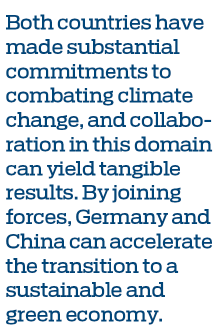Germany, China should nurture resilience
The relationship between Germany and China has stood the test of time, characterized by the mutual respect and fruitful cooperation that has spanned several decades. However, recent global events have underscored the importance of bolstering resilience and diversifying industrial and supply chains.
The tumultuous experiences of the pandemic and the war in Ukraine have left many in Germany feeling deeply unsettled. As a result, there is a growing emphasis on identifying potential vulnerabilities and spreading risks across multiple partners. It is worth noting that this recognition of risk is shared in China as well.
The German government's current focus on de-risking should not be misconstrued as a call for decoupling. Rather, it is an acknowledgment that businesses must proactively identify and address risks to ensure the stability and security of supply chains. In fact, a study by the Kiel Institute for the World Economy released in February revealed that Germany's dependence on China is considerably lower than suggested by recent trade statistics. Therefore, it is crucial to approach the issue of economic interdependence with objectivity, avoiding unnecessary sensationalism.
The prevailing perception of China in Germany and Europe is undeniably influenced by the great power competition between the United States and China.
Within Germany and the European Union, there exists a multitude of differing views, making it challenging to form a cohesive and unified policy toward China. Germany's stance on its relationship with China carries significant weight, as it has the potential to shape the direction of the entire European Union. In this context, Germany, despite its long history of transatlantic partnerships, must be cautious not to align itself too closely with US interests. Chancellor Olaf Scholz is well aware of this and appreciates the need for an independent and balanced approach.
Germany's current emphasis on decarbonization and climate protection presents a remarkable opportunity for future cooperation with China. Both countries have made substantial commitments to combating climate change, and collaboration in this domain can yield tangible results. By joining forces, Germany and China can accelerate the transition to a sustainable and green economy.
This collaboration can go beyond climate action and encompass other areas such as renewable energy, sustainable urban development and environmental technology. By harnessing the collective expertise and resources of both nations, Germany and China can lead the charge in addressing the most pressing challenge of our time.
The resumption of bilateral government consultations between Germany and China after the COVID-19 pandemic is a positive development. These consultations allow representatives from both governments to reconvene and build upon a long-standing tradition. This year marks the 45th anniversary of the signing of the bilateral basic treaty on scientific and technological cooperation between Germany and China in 1978. However, it is crucial to acknowledge that this year's consultations take place amid more challenging domestic political conditions in Germany and evolving geopolitical dynamics in Europe.
A considerable portion of the German business community eagerly anticipates the consultations, holding hope for fruitful outcomes. Nevertheless, they also recognize the need for pragmatic initiatives at the nongovernmental level, should the consultations fail to bridge the differences that have recently emerged in German-Chinese relations during Foreign Minister Annalena Baerbock's visit to Beijing and afterward. The German business community is steadfast in its commitment to maintaining strong ties with China, recognizing the significance of sustained cooperation for the economic prosperity of both nations.
As Premier Li Qiang makes his first visit to Germany since assuming office, there are high expectations for the visit. The German public and business community hope that the visit will yield constructive dialogue and lay the foundation for enhanced cooperation. Both nations must recognize the changing global landscape and the imperative to adapt. Addressing concerns about supply chain vulnerabilities, fostering a balanced approach to China's rise, capitalizing on climate collaboration, and reaffirming their shared commitment to bilateral cooperation are vital steps toward a prosperous future.
Germany and China have a unique opportunity to shape their relationship in a manner that promotes mutual benefit and cooperation while acknowledging the complexities and challenges that lie ahead. By building on the solid foundation of trust, respect and fruitful collaboration, both nations can navigate the evolving global landscape and forge a path toward shared prosperity, thereby setting an example for fruitful cooperation between the European Union and China.

The author is chairman of the board at the German Federal Association for Economic Development and Foreign Trade and chairman of China Bridge, a public diplomacy forum in Berlin for German-Chinese relations.














